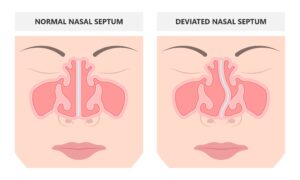Do you feel as though you’re not getting enough air? Or are you constantly short of breath?
These issues can develop gradually or may happen more suddenly. There are various reasons why you may be facing breathing challenges.
Understanding what’s causing your breathing problems can help address the root cause and alleviate your breathing issues. Keep reading to learn more about the signs of breathing problems, possible reasons behind your breathing difficulties, and treatment options to improve your breathing.
Signs of Breathing Problems
If you’re having difficulty breathing, the most apparent symptom is feeling short of breath or breathless. Other signs include:

- Wheezing
- Dizziness
- Flaring nostrils
- Head sweat
- A barking cough
- Fever
- Pressure or pain in the chest
- Shallow or labored breathing
- Anxiety and restlessness
- Watery eyes
- Chest and nasal congestion
- Tightness in the throat
- Gray or pale skin
- Weakness and fatigue with or without exertion
- Staying awake at night or sitting up constantly because of shortness of breath
Causes of Breathing Problems
Breathing issues can be mild or severe and temporary or chronic. Often, they increase with age and involve:
- Uncomfortable breathing
- Difficulty breathing
- Feeling like you can’t get adequate air
There are many causes behind breathing problems. They can occur due to the following:
Allergies

An allergy happens when your immune system becomes overly sensitive to a substance introduced to your body that would otherwise be harmless to others. That triggers an allergic reaction, which can range from mild to life-threatening.
There are different types of allergies. These can include pollen, food, pet, and drug allergies.
Two common symptoms of allergies are nasal congestion and feeling as though you can’t inhale as deeply or as fully as you’d like.
Deviated Septum

Your nostrils are divided right in the middle by cartilage and bone, known as a septum. But sometimes, the septum may be deviated or crooked. If this is the case, it can cause one nostril to collapse or become smaller than the other.
A deviated septum can block the flow of air through your nose, making it hard to breathe. It can also lead to frequent sinus infections and congestion.
Sinusitis
Sinusitis or a sinus infection occurs when the tissue lining in your sinuses gets infected, inflamed, and swollen. The inflammation and swelling can cause your nasal passageways to narrow and interfere with normal breathing.
Environmental Factors

Environmental factors like ozone, pollution, dry air, mold, paint, cigarette smoke, fumes from household cleaners, and dust can all induce allergies and problems with breathing.
Treatment Options for Breathing Problems
If you’re struggling to breathe, your ENT specialist at Suburban Otolaryngology may recommend or provide the following treatments for breathing difficulties:
Decongestants

When your body recognizes allergies or a sinus infection, it increases blood flow to the blood vessels in your nose to combat the problem. As a result, the tissue and blood vessels in your nose swell, making it hard to breathe through the nose.
Decongestants constrict your blood vessels and shrink the swollen tissue inside your nose. In turn, this opens your upper airways for easier breathing.
Decongestants are available in the form of nasal sprays or pills. ENT specialists recommend taking them for only three days.
Otherwise, your body may become dependent on the medications. If you become dependent, your congestion can worsen when you stop using decongestants.
Nasal Steroids
Inhaled nasal steroids reduce swelling, mucus, inflammation, and congestion in your nose due to allergies. These things help improve your breathing and make you less likely to become irritated by triggers like pollen, dust mites, or dander.
Nasal steroids work best when used daily. You may have to use them consistently for around 2 to 3 weeks or, as instructed by your ENT specialist, to experience relief. Your healthcare provider can also prescribe steroids in oral form.
Unlike nasal steroids, oral steroids don’t just decrease inflammation in a specific area. Their effects are experienced throughout your whole body and are typically stronger than nasal steroids.
Natural Remedies
Home treatments can also alleviate your breathing problems. They include:
Neti Pot

Many otolaryngologists recommend using a neti pot for nasal congestion, sinus infections, and allergies. A neti pot is made from ceramic or plastic and looks like a tiny teapot.
To use a neti pot, you’ll fill it with a solution of salt and purified water. It allows you to pour the saline mixture into your nostrils in a manner that thins out the mucus and flushes out allergens.
Thinning out mucus and allergens reduces congestion and makes breathing much easier through your nose.
Sinus Rinsing
Sinus rinsing is an at-home remedy to rinse your sinuses. Just like the neti pot, it entails using a rinse bottle containing a mix of sodium chloride and water to flush out what’s blocking the sinus passages. The block in the sinuses comprises:
- Mucus
- Allergens
- Germs like viruses and bacteria
Besides clearing your sinuses, sinus rinsing can bring down swelling and improve your breathing. You can purchase the ingredients for sinus rinsing over the counter at most drug stores.
Steam
Inhaling warm, moist stem helps reduce swollen blood vessels in your nasal passages and loosen mucus in your sinuses. Loosening mucus in your sinuses makes it easier to empty them and resumes the ability to breathe normally.
Cool and Hot Mist Vaporizers

Vaporizers are used for allergies. Hot and cool mist vaporizers cause the air to become moist, making them an effective remedy for congestion.
Both vaporizers add humidity in different ways. A hot mist vaporizer heats water and releases steam into the air.
A cool mist vaporizer uses a fan to evaporate water and add cool fine vapor into the air. Breathing in moist air can relieve irritated sinuses and minimize nasal stuffiness.
Balloon Sinuplasty

A sinus infection can interfere with your breathing. Your ENT specialist at Suburban Otolaryngology may suggest balloon sinuplasty if sinusitis medications or at-home treatments don’t work.
During the outpatient procedure, your ENT surgeon inserts a balloon with a flexible catheter inside your nose. Once in the proper position, your surgeon expands the balloon to widen the narrow sinuses permanently.
Your surgeon can also use a saline solution to eliminate accumulated mucus. Balloon sinuplasty restores normal sinus function and drainage. It also leads to better, unobstructed breathing.
Get Expert Help for Your Breathing Problem

You don’t have to continue suffering from breathing difficulties—the experienced ENT specialists at Suburban Otolaryngology offer top-of-the-line treatment options to improve your quality of life.
Want to find a long-lasting solution to your persistent breathing problems? Schedule your appointment at Suburban Otolaryngology in Berwyn, IL, to start breathing better.










